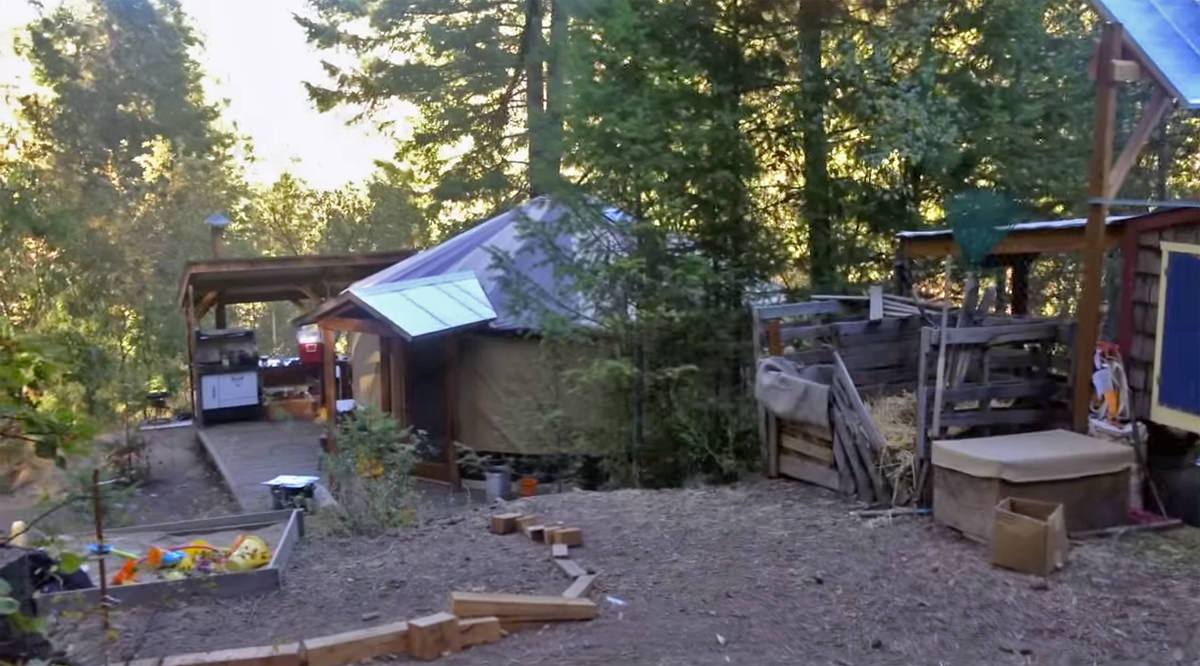How To Become More Self-Sufficient Without Starting a Full-Blown Farm…
Want to start preserving your harvest, making your own soap, or building a backyard root cellar — but not sure where to begin? “Homesteading Advice” gives you instant lifetime access to 35+ practical homesteading books on food preservation, veggie gardening, DIY natural cleaning products (save over $250 per year with this skill alone), brewing, off-grid energy, and a whole lot more…
Click Here To Check It Out Now!
This one is lighthearted and encouraging, but it’s also true. Nick Fouch and Esther Emery, moved off the grid in 2013 and since then their family of five lives in a 314 square foot yurt in the Boise foothills while building their off grid timber frame dream home.
Esther’s mother, Carla Emery, wrote the homesteading and self sufficiency classic, “The Encyclopedia of Country Living.”, but that did not mean Esther knew everything about off-grid living already.
The number one question they get over and over again is “What do you wish you had known before you had made the shift to off-grid living?” Here’s their lighthearted and encouraging response:
1. Solar power is easier than you think
“It took me a long time to get comfortable with the idea of all these different solar components and it was also confusing, but there’s a lot of good literature out there that simplifies it. And you’re not going to get it horribly wrong. You can get a free solar power evaluation here.
2. Plants can’t grow without soil
“We wasted some time our first year trying to grow plants in the soil without realizing that our first job was to create soil. So we have a number of ways of doing that. Just bringing in any kind of organic matter, from various kinds of manure to grass clippings or leaves. We now use a chicken tractor to use our chicken manure to really create soil, even right in the middle of our garden plot where we just had dry clay soil before. We do a lot of sheet mulching, and we’re building our earth so that when we plant the plants they’ll actually grow.”
3. Water runs downhill
“Gravity fed water systems are a lot easier than you think, and it’s just worth hooking it up and experimenting and see what it’s able to do.”
4. Carrying water is the worst. The literal worst.
“We carry our water in 5 gallon buckets all winter long. This will be our third winter of doing that, and if all goes according to our very very detailed and careful plan this is our last winter of it. And that’s good, because it’s back breaking labor.”
5. Batteries run out
“We now have rechargeable headlamps. They’re expensive, but they will never go bad so instead of buying a whole bunch of AAA batteries all the time and throwing them out we just plug these in and recharge them.”
6. Bears like trash
“Okay, so we already knew that before we moved out here, technically, but I think we didn’t realize what a priority that was.”
7. Firewood is a ton of work
“Every year we have to fill this woodshed – it takes about 5 cords of wood or so to get us through the winter – and that’s a lot of work. Getting it all over here and split and cut into the right shape and size and making sure it’s all dry and actually useful as firewood”. Here’s a nice firewood rack design.
8. Yurts are better at cold weather than they are at hot weather
“We underestimated the brilliant design of a yurt. If it’s insulated it holds heat very well. And we also underestimated the extent to which hot air would be trapped in the summertime.”
9. Temporary is longer than you think
“Our plan before we had ever done any part of living off the grid was to be in the yurt for a year. Well that’s going to be at least three years before we have our house habitable. I guess the takeaway from that is you just don’t know until you’re doing it. So if you’re setting up a temporary situation you might as well make it comfortable enough to be in for a while.”
10. You can do things you didn’t know you could do
“An attitude of learning and an attitude of being okay with accepting that the lessons we need to learn are sometimes kind of elementary is allowing us to make the changes that we’ve always dreamed of making.”
Check it out in the video below…
If you like this idea, be sure to share it with your friends and inspire someone you know. Anything becomes possible with just a little inspiration…

